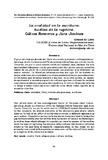| dc.rights.license | http://creativecommons.org/licenses/by-nc-sa/3.0/ve/ | |
| dc.contributor.author | de Llano, Aymará | |
| dc.date.accessioned | 2011-12-08T14:45:11Z | |
| dc.date.available | 2011-12-08T14:45:11Z | |
| dc.date.issued | 2011-12-08T14:45:11Z | |
| dc.identifier.issn | 1315-8392 | es_VE |
| dc.identifier.uri | http://www.saber.ula.ve/handle/123456789/34247 | |
| dc.description.abstract | El presente trabajo aborda dos libros de cuentos peruanos contemporáneos: Monólogo desde las tinieblas (1975) de Antonio Gálvez Ronceros y Babá Osaím,
Cimarrón, ora por la santa muerta (1989) de Cronwell Jara Jiménez. En esta oportunidad trabajamos con los procedimientos discursivos que nos permiten
hablar de un efecto de oralidad plasmado con planteos muy diferentes en ambos autores. La literatura latinoamericana del siglo XX ha tratado de
zanjar el abismo entre oralidad y escritura mediante diversos procedimientos escriturarios que intentan traducir o mostrar, en la letra escrita, los modos
de aprehender el mundo por parte de culturas que han cultivado la oralidad como único medio de comunicación lingüística. El interés último del artículo
se dirige a tomar consciencia del valor de estas obras como registro de la memoria colectiva. | es_VE |
| dc.language.iso | es | es_VE |
| dc.rights | info:eu-repo/semantics/openAccess | |
| dc.subject | Oralidad | es_VE |
| dc.subject | Perú | es_VE |
| dc.subject | Cultura afro-peruana | es_VE |
| dc.subject | Escritura | es_VE |
| dc.title | La oralidad en la escritura: huellas de la ruptura. Gálvez Ronceros y Jara Jiménez | es_VE |
| dc.title.alternative | Orality in writing: traces of the rupture: Galvez Ronceros and Jara Giménez | es_VE |
| dc.type | info:eu-repo/semantics/article | |
| dc.description.abstract1 | This article looks at two contemporary books of Peruvian short stories: Monólogo desde las tinieblas (1975) by Antonio Galvez Ronceros and Baba
Osaim, Cimarrón, ora por la santa muerta (1989) by Cronwell Jara Gimenez. In this research, we availed ourselves of the discursive procedures which
allow us to talk of an effect of orality which reveals a different approach in each author. Twentieth century Latin American literature tried to bridge the
gap between orality and the written form by means of various methodologies in written form which attempt to translate or show by means of the written
word the ways of capturing the world used by cultures which have cultivated orality as the only form of linguistic communication. In this study, we are
primarily concerned with acquiring an awareness of the value of those works as a register of the collective memory. | es_VE |
| dc.description.colacion | 95-108 | es_VE |
| dc.description.email | dellano@mdp.edu.ar | es_VE |
| dc.description.frecuencia | anual | es_VE |
| dc.identifier.depositolegal | PP89-0023 | es_VE |
| dc.subject.dependencia | Maestría en Literatura Iberoamericana | es_VE |
| dc.subject.facultad | Facultad de Humanidades y Educación | es_VE |
| dc.subject.keywords | Orality | es_VE |
| dc.subject.keywords | Afroperuvian culture | es_VE |
| dc.subject.keywords | Writing | es_VE |
| dc.subject.publicacionelectronica | Voz y Escritura. Revista de Estudios Literarios | es_VE |
| dc.subject.seccion | Voz y Escritura. Revista de Estudios Literarios: Artículos | es_VE |
| dc.subject.thematiccategory | Artes y Humanidades | es_VE |
| dc.subject.tipo | Revistas | es_VE |
| dc.type.media | Texto | es_VE |


